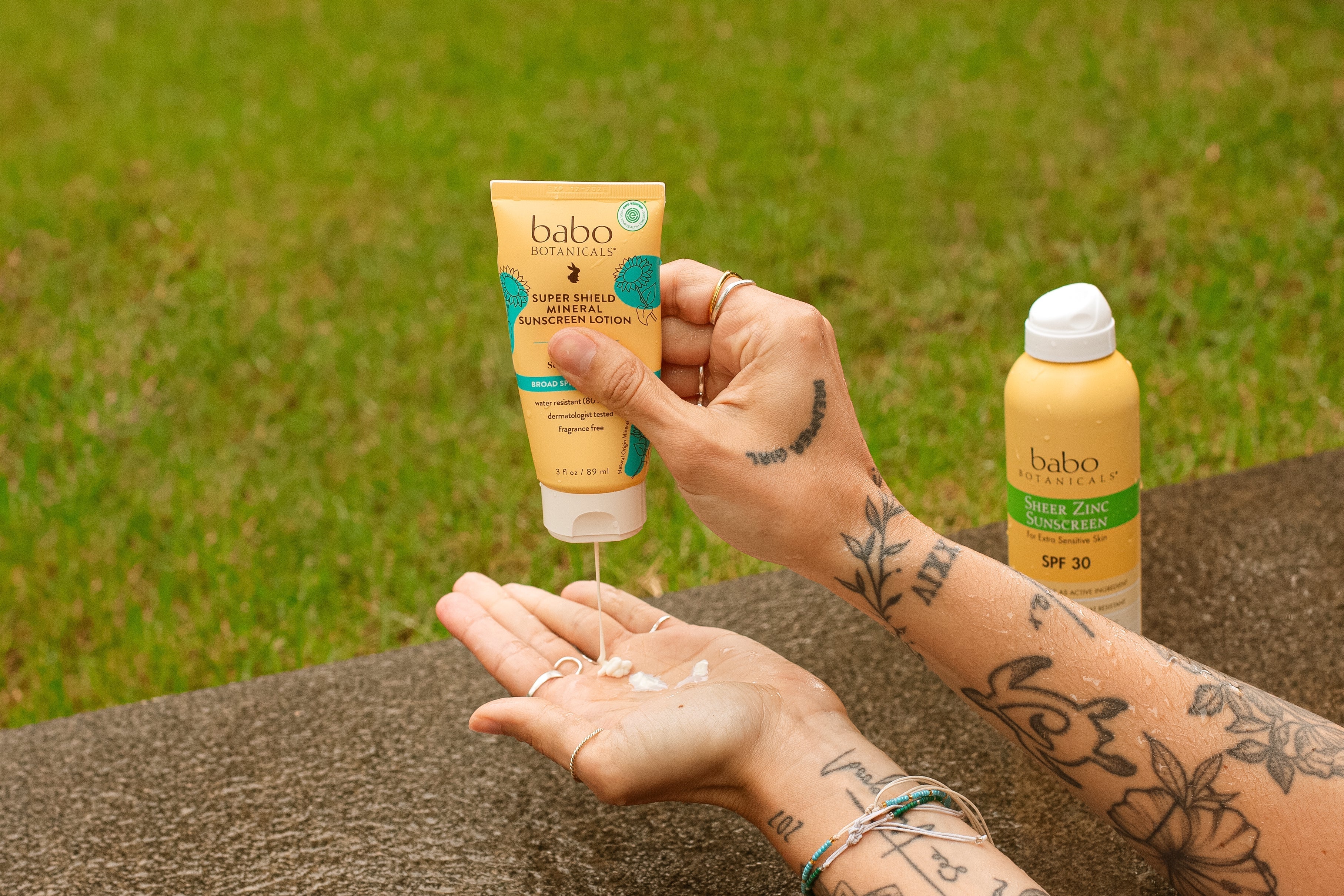
Tattoo Protection Guide: Long-Term Tattoo Care Tips
Whether it’s your first tattoo or you’re just ready to add another one to the collection, we’re here for it! Tattoos are an art form and a way of expressing yourself, but they’re also invasive and take time to heal. This is why tattoo care and aftercare are both so important.
In addition to keeping your tattoo as vibrant and bold as you by caring for it over the years, how you care for your skin in the days and weeks right after getting your new ink is extremely important.
The right care can make a difference both in the health of your skin and the look of your tattoo.
Don’t stress! We’ve got you covered with what you need to know about tattoo care and aftercare — what to think about before you go, taking care of your skin immediately after your ink as well as in the first few weeks, and long-term tattoo care.
But first, let’s start with a quick review of why tattoo care is so important.
Why Tattoo Care Is Essential

Getting a tattoo isn’t an operation, your doctor doesn’t have a say-so, and no hospital stay is required (thank goodness). But getting a tattoo means that ink is inserted into your skin via a needle.
This opens the skin, leaving it vulnerable for a time. Allergic reactions or skin infections are possible. Taking care of your skin after getting your dream design is essential!
The other big reason to take care of your tattoo long-term is, of course, that you’ll want to keep it as vibrant and like-new as possible.
Now, let’s get straight to tattoo care, starting with how to set yourself up for success before you even go to the tattoo parlor!
Tattoo Care: Before You Go
When we talk about looking out for your skin and your tattoo even before you go to the tattoo parlor, we’re talking mostly about three things: finding a good tattoo artist, strategically choosing when to get your new ink, and what to think about if you have eczema.
Choosing An Artist
When it comes to picking the right artist or tattoo parlor, you want someone who will not only create a design that fulfills your every wish and dream but also provide a hygienic and safe experience.
Ask friends for recommendations, and do your research on artists and parlors that interest you.
Planning Around Vacations

It’s also a good idea to plan your tattoo around trips or vacations (especially if time in the sun is involved).
Don’t show up at the tattoo parlor red as a lobster from your beach vacation. Likewise, you’ll need to allow time afterward for your skin to recover before you bask in the sun.
Remember, getting a tattoo is invasive and your skin will take a while to heal. Exactly how long it will take depends on the sort of tattoo you plan on getting.
Have a chat with your tattoo artist about your design and ask them how long you should allow for your skin to heal.
Considering Eczema
People who have eczema should take more care with their tattoos, as new tattoos can lead to a flare-up in eczema symptoms.
Because tattoos involve injecting ink into the skin, the ink can act as a trigger for further flare-ups. Tattoos and eczema can peacefully coexist, as it were, but the healing process will take longer for new tattoos.
If you have eczema and are thinking about getting a tattoo, many doctors and artists will advise having a patch test done before the actual tattoo, where a bit of ink will be injected and then monitored for any allergic reaction.
Tattoo Aftercare: The First Couple Of Days
New tattoo: check. You did it! You’re feeling pretty good about it — and probably in some pain as well, but we won’t go there.
What do the first couple of days look like when it comes to tattoo aftercare? First of all, follow your tattoo artist’s instructions. Before they send you on your way, they’ll apply an ointment and a bandage or cling wrap.
Remove your bandage when told to do so by the artist — the time will vary based on tattoo size and artist preference. Typically it’s anywhere from a couple of hours to a whole day.
When it’s time to remove the bandage or cling wrap, gently peel it off and — first things first — take a moment to enjoy your new ink and picture what it will look like when it’s all healed up. Then, carefully wash, dry, and apply ointment to your sensitive skin.
This is the routine you’ll repeat multiple times over the next couple of days.
Wash

Start by cleaning your hands well so that you don’t transmit any germs from your hands to your recently tattooed skin.
Once your hands are squeaky clean, wash your tattoo with warm water and soap. And when we say wash, we mean gently with your fingers. No scrubbing with a washcloth or anything else that might irritate your already-sensitive skin.
Another way that you’ll want to look out for your sensitive skin is by choosing the right soap. Wash your tattoo area with a gentle, fragrance-free soap, like Sensitive Baby Fragrance Free Foam Hand Soap.
Oh, and don’t let the name fool you. This soap is for the whole fam!
Why is a fragrance-free soap important? There are many ingredients in soaps and other skincare products that can be irritating to your skin, and with a brand new tattoo, you want to spare your skin from any extra irritant!
Dry
After cleansing and rinsing your skin, pat it dry with a towel or paper towel. Remember: no scrubbing or rubbing! That could potentially smear the ink. You can also give it some time to air dry.
Apply Ointment

Your tattoo artist may have given you (or recommended) an ointment to apply. Stick with this for the first couple of days or even a week, and apply a thin layer of ointment to the tattoo, making sure to cover the entire area.
And, unless your artist suggests otherwise, leave the bandage off to allow your skin to breathe.
One of the most important aspects of tattoo healing is the ointment that is used to aid in the healing process. There are so many options that it can be hard to narrow down what works best for you. (Try our Sensitive Skin All Natural Healing Ointment!)
Applying ointment to your tattoo can speed up the healing process. After the tattoo has finished healing, simply treat it like the rest of your skin and make sure it stays moisturized.
One more tip. Keep in mind that the first few nights of sleep might not be the best you’ve ever had. Your skin will still be tender and, depending on where your tattoo is, it might be hard to get comfy in bed.
Finally, consider throwing some old sheets on the bed in case your tattooed area leaks fluid onto the sheets while you’re snoozing.
Tattoo Aftercare: Keeping Up The Routine

Ongoing, short-term tattoo care basically consists of the same wash, dry, apply routine that we just mentioned.
Go through these steps once or twice a day in the coming weeks. The only thing that will change is that you can switch to a lotion (instead of an ointment) to moisturize and protect your tattooed skin.
The same rules that applied to soap also apply to lotion — it should be gentle and fragrance-free. Often baby lotions are the best option to meet these requirements. We recommend Babo Botanicals Sensitive Baby Hydrating Baby Lotion since it checks both boxes.
What will your skin look and act like several days after you get your tattoo? Toward the middle or end of the first week, the redness will likely begin to fade, but you’ll notice thin scabs. Don’t pick them!
Picking can scar your skin or damage the tattoo. Plus, you should be as gentle as possible with your newly tattooed skin.
If your skin is very itchy, lather on the lotion. Or you can opt for coconut oil, which works as a moisturizer and provides wonderful benefits for your skin.
Keep in mind that there is a method called tattoo dry healing, which simply avoids the use of lotions and moisturizers. The main reason behind this method is to avoid irritating your already-irritated skin with any fragrances, chemicals, or allergens that might be in the lotion.
However, if you choose a fragrance-free and gentle cream (like Sensitive Baby Hydrating Baby Lotion), you’ve taken care of those concerns.
Tips To Help Your Skin Heal
When it comes to basic tattoo care, you’ll want to follow the routine we recommended above. Keep in mind that your skin is still healing up to four weeks after getting your ink (or longer for more intricate designs).
To help the healing process along, here are a few more things you can do:
- Avoid direct sunlight if at all possible.
- Protect your skin from the sun by wearing protective clothing.
- Don’t scratch.
- Don’t rub or pick at the flaking skin.
- Don’t go swimming, and stick to short showers until your tattoo has fully healed, as water can also affect a tattoo.
- Don’t shave. When you can slide your fingers over your tattoo without feeling any bumps, you should be good to go.
- Wear loose clothing.
- Take good care of yourself. Remember that your body is healing!
Long-Term Tattoo Care
Your tattoo is with you for life! Luckily, when it comes to long-term tattoo care, there’s not much you have to do. Your days of wash, dry, apply, repeat will be over after the first few weeks.
However, tattoo protection is important to maintain the integrity and overall design of your new ink. The more a tattoo is in direct sunlight, the more the colors will fade and potentially change.
Tattoo colors are bound to fade naturally, but you can prevent the worst from happening by doing your best to limit direct sun exposure.
There are a number of ways to protect your tattoo from fading. If you have a large arm piece or a tattoo sleeve, there are special tattoo covers available to wear that can block harmful UV light from reaching your tattoo.
The other thing you can do over the years to keep your tattoo looking its finest: always apply sunscreen over your tattooed area.
For the sake of your skin and body, we always recommend a mineral sunscreen that’s made with zinc oxide (this goes for your tattooed area as well as the rest of your body!).
Try Babo Botanicals Sheer Zinc Mineral Sunscreen Lotion SPF30. This sunscreen is free of chemicals like oxybenzone and octinoxate. Instead, it’s made with 16% zinc oxide to provide broad-spectrum protection and certified organic oils to moisturize your skin.
For your face, we recommend using our Daily Sheer Facial Sunscreen, which has SPF 40 and is fragrance-free.
You And Your Tattoo: Together For Life
Tattoo aftercare is one of the most important parts of the tattoo process. Tattoo care can mean the difference between having a vibrant, colorful tattoo and having the colors and/or lettering fade more quickly.
The days and weeks after getting a new tattoo are critical. Proper tattoo care is essential during the healing process and after your new ink is fully healed.
Turn to Sensitive Skin All Natural Healing Ointment, Sensitive Baby Hydrating Baby Lotion, and Sheer Zinc Mineral Sunscreen Lotion SPF30 to care for your tattoo during all of the aftercare stages!





